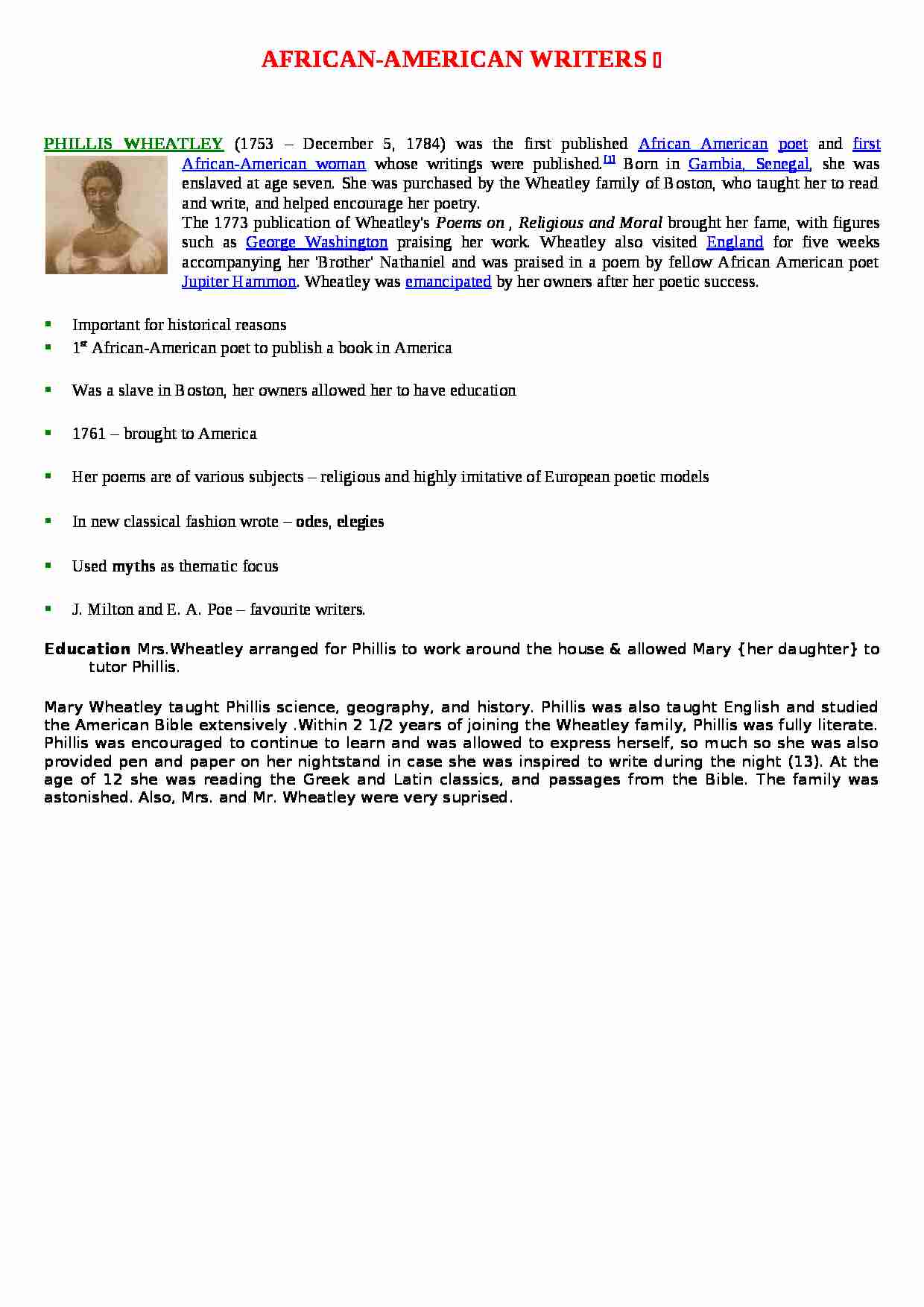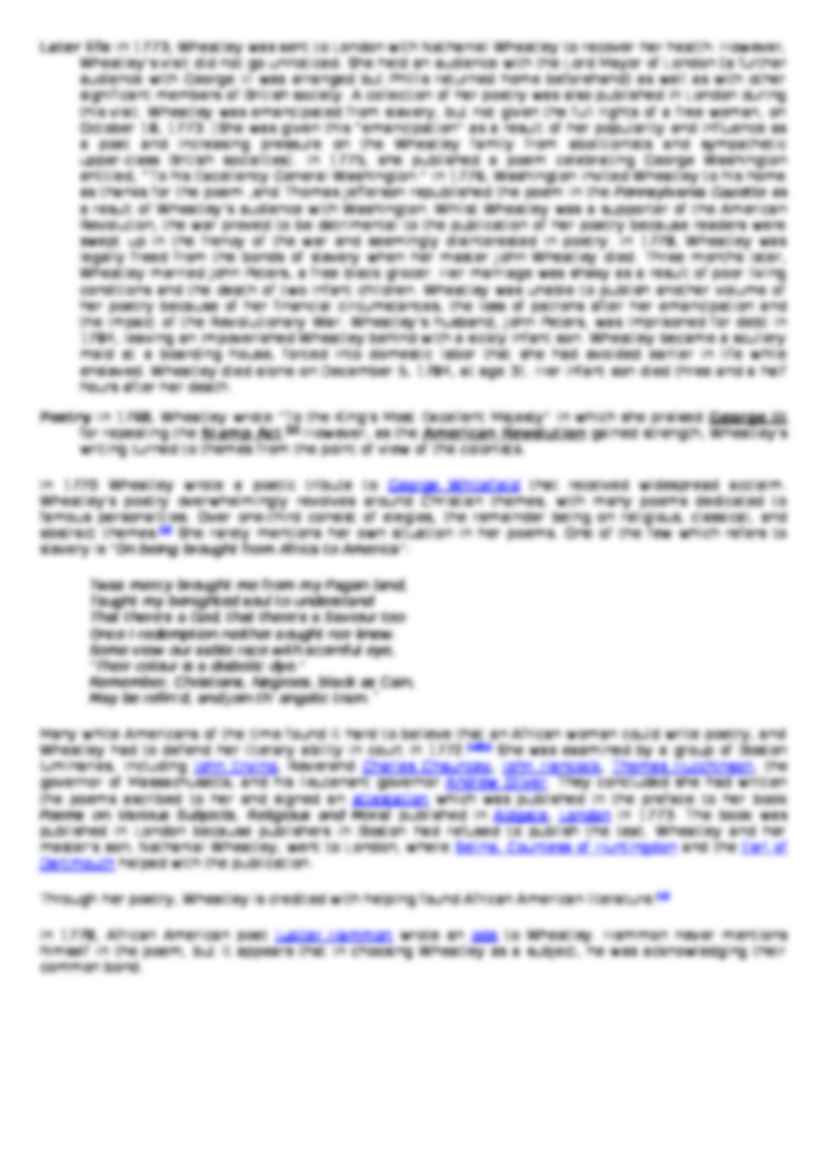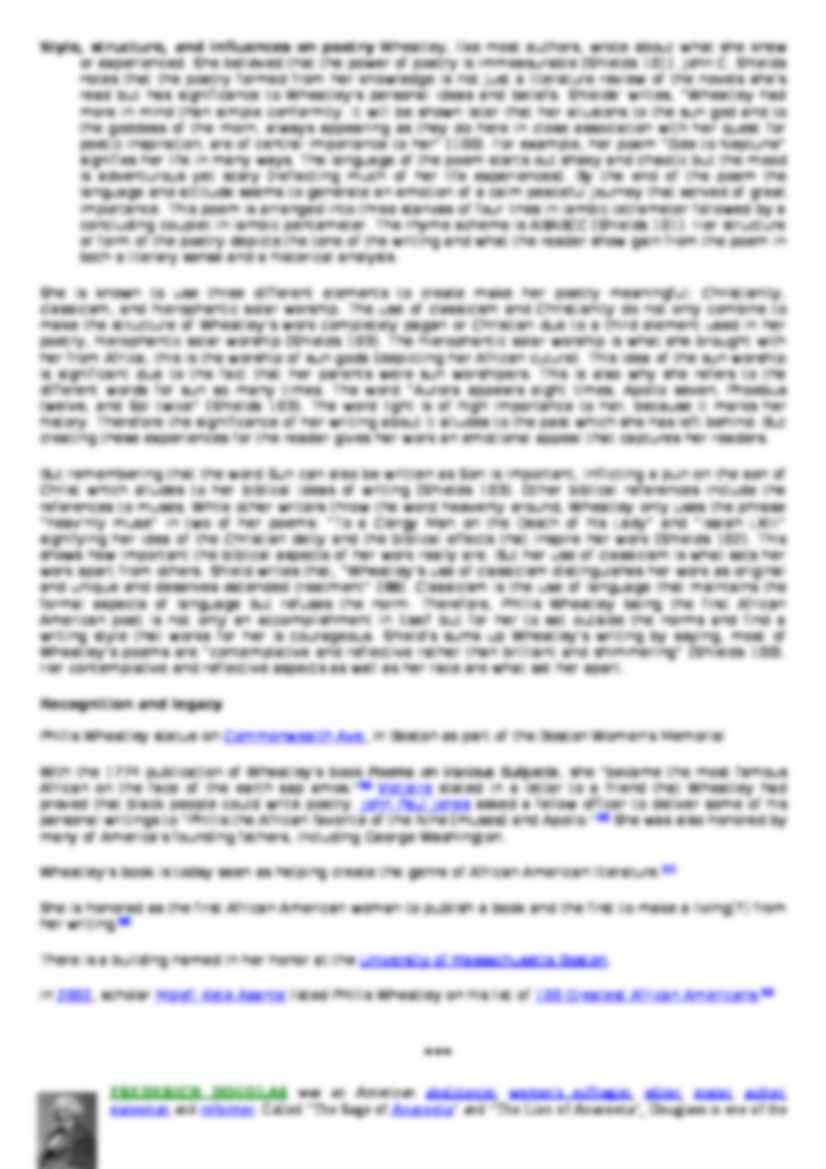AFRICAN-AMERICAN WRITERS Phillis Wheatley (1753 - December 5, 1784) was the first published African American poet and first African-American woman whose writings were published.[1] Born in Gambia, Senegal, she was enslaved at age seven. She was purchased by the Wheatley family of Boston, who taught her to read and write, and helped encourage her poetry.
The 1773 publication of Wheatley's Poems on , Religious and Moral brought her fame, with figures such as George Washington praising her work. Wheatley also visited England for five weeks accompanying her 'Brother' Nathaniel and was praised in a poem by fellow African American poet Jupiter Hammon. Wheatley was emancipated by her owners after her poetic success.
Important for historical reasons
1st African-American poet to publish a book in America
Was a slave in Boston, her owners allowed her to have education
1761 - brought to America
Her poems are of various subjects - religious and highly imitative of European poetic models
In new classical fashion wrote - odes, elegies
Used myths as thematic focus J. Milton and E. A. Poe - favourite writers.
Education Mrs.Wheatley arranged for Phillis to work around the house & allowed Mary {her daughter} to tutor Phillis.
Mary Wheatley taught Phillis science, geography, and history. Phillis was also taught English and studied the American Bible extensively .Within 2 1/2 years of joining the Wheatley family, Phillis was fully literate. Phillis was encouraged to continue to learn and was allowed to express herself, so much so she was also provided pen and paper on her nightstand in case she was inspired to write during the night (13). At the age of 12 she was reading the Greek and Latin classics, and passages from the Bible. The family was astonished. Also, Mrs. and Mr. Wheatley were very suprised.
Later life In 1773, Wheatley was sent to London with Nathaniel Wheatley to recover her health. However, Wheatley's visit did not go unnoticed. She held an audience with the Lord Mayor of London (a further audience with George III was arranged but Phillis returned home beforehand) as well as with other significant members of British society. A collection of her poetry was also published in London during this visit. Wheatley was emancipated from slavery, but not given the full rights of a free woman, on October 18, 1773. [She was given this “emancipation” as a result of her popularity and influence as a poet and increasing pressure on the Wheatley family from abolitionists and sympathetic upper-class British socialites]. In 1775, she published a poem celebrating George Washington entitled, “To his Excellency General Washington.” In 1776, Washington invited Wheatley to his home as thanks for the poem ,and Thomas Jefferson republished the poem in the
(…)
… marriage was shaky as a result of poor living conditions and the death of two infant children. Wheatley was unable to publish another volume of her poetry because of her financial circumstances, the loss of patrons after her emancipation and the impact of the Revolutionary War. Wheatley's husband, John Peters, was imprisoned for debt in 1784, leaving an impoverished Wheatley behind with a sickly infant son. Wheatley became a scullery maid at a boarding house, forced into domestic labor that she had avoided earlier in life while enslaved. Wheatley died alone on December 5, 1784, at age 31. Her infant son died three and a half hours after her death.
Poetry In 1768, Wheatley wrote "To the King's Most Excellent Majesty" in which she praised George III for repealing the Stamp Act.[2] However, as the…
… her master's son, Nathanial Wheatley, went to London, where Selina, Countess of Huntingdon and the Earl of Dartmouth helped with the publication.
Through her poetry, Wheatley is credited with helping found African American literature.[4]
In 1778, African American poet Jupiter Hammon wrote an ode to Wheatley. Hammon never mentions himself in the poem, but it appears that in choosing Wheatley as…
… words for sun so many times. The word “Aurora appears eight times, Apollo seven, Phoebus twelve, and Sol twice” (Shields 103). The word light is of high importance to her, because it marks her history. Therefore the significance of her writing about it alludes to the past which she has left behind. But creating these experiences for the reader gives her work an emotional appeal that captures her…
… suffragist, editor, orator, author, statesman and reformer. Called "The Sage of Anacostia" and "The Lion of Anacostia", Douglass is one of the most prominent figures in African American and United States history. He was a firm believer in the equality of all people, whether black, female, Native American, or recent immigrant. He was fond of saying, "I would unite with anybody to do right and with nobody…
… a race, up by the bootstraps. He reflects on the generosity of both teachers and philanthropists who helped in educating blacks and native Americans. He describes his efforts to instill manners, breeding, health and a feeling of dignity to students. His educational philosophy stresses combining academic subjects with learning a trade (something which is reminiscent of the educational theories of John…
... zobacz całą notatkę






Komentarze użytkowników (0)